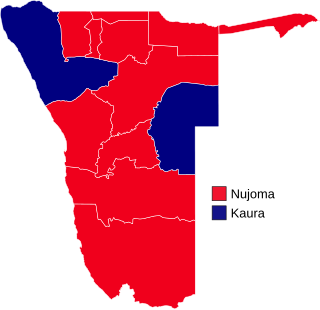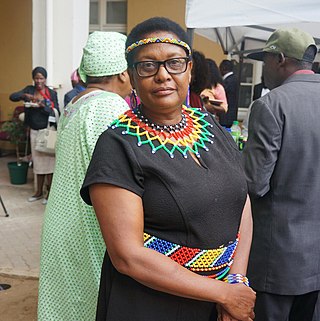Related Research Articles

Politics of Namibia takes place in a framework of a semi-presidential representative democratic republic, whereby the President of Namibia is both head of state and head of government, and of a pluriform multi-party system. Executive power is exercised by both the president and the government. Legislative power is vested in the two chambers of Parliament. The judiciary is independent of the executive and the legislature.

The South West Africa People's Organisation, officially known as the SWAPO Party of Namibia, is a political party and former independence movement in Namibia. Founded in 1960, it has been the governing party in Namibia since the country achieved independence in 1990. The party continues to be dominated in number and influence by the Ovambo ethnic group.

Theo-Ben Gurirab was a Namibian politician who served in various senior government positions. He served as the second Prime Minister of Namibia from 28 August 2002 to 20 March 2005, following the demotion and subsequent resignation of Hage Geingob. Previously he was the country's first Minister of Foreign Affairs from 1990 to 2002, and was President of the United Nations General Assembly from 1999 to 2000. He was Speaker of the National Assembly of Namibia from 2005 to 2015, when he was replaced by Peter Katjavivi. Gurirab ultimately resigned from politics in 2015.
Hidipo Livius Hamutenya was a Namibian politician. A long time leading member of the South West Africa People's Organization (SWAPO), Hamutenya was a member of the Cabinet of Namibia from independence in 1990 to 2004, serving in several important ministerial portfolios. He was defeated in a bid for the party's presidential nomination in 2004 and left SWAPO to form an opposition group, the Rally for Democracy and Progress (RDP), in 2007. He was elected to the National Assembly of Namibia with RDP in the 2009 general election. He was forced to step down as RDP president on 28 February 2015 and rejoined SWAPO on 28 August 2015.

Elections in Namibia determine who holds public political offices in the country. Namibia is a semi-presidential representative democratic republic. It runs direct elections every five years for the position of the president and seats in the National Assembly, and every six years for the Regional Councils and the distribution of seats in local authorities. The National Council is elected indirectly by the constituency councillors of Namibia's 14 regions.

The Congress of Democrats (CoD) is a Namibian opposition party without representation in the National Assembly and led by Ben Ulenga. It was established in 1999, prior to that year's general elections, and started off with a number of notable politicians that left the ruling SWAPO party. This includes Ulenga who left SWAPO to protest plans to amend the constitution so that President Sam Nujoma could run for a third term.
Dirk Frederik Mudge was a Namibian politician. He served in several high-ranking positions in the South African administration of South West Africa, was the chairman of the 1975–1977 Turnhalle Constitutional Conference, and co-founded the Republican Party (RP) of Namibia as well as the Democratic Turnhalle Alliance (DTA), now known as the Popular Democratic Movement (PDM).

Hage Gottfried Geingob is a Namibian politician, serving as the third president of Namibia since 21 March 2015. Geingob was the first Prime Minister of Namibia from 1990 to 2002, and served as prime minister again from 2012 to 2015. Between 2008 and 2012 Geingob served as Minister of Trade and Industry. He is also the current president of the ruling SWAPO Party since his election to the position in November 2017.
Benjamin Ulenga is a Namibian politician. In the 1990s, he served under the SWAPO government as a deputy minister and as an ambassador, but he left SWAPO in 1998 and founded an opposition party, the Congress of Democrats (CoD), in 1999. He was a member of the National Assembly of Namibia from 2000 to 2015 and led the CoD until 2015.

Usakos is a town on the banks of river Khan, 140 kilometres north-east of Swakopmund in the Erongo Region of Namibia. It is located on the B2, the main road between the Walvis Bay and Johannesburg. The town has 3,000 inhabitants and owns 58 square kilometres (22 sq mi) of land.

General elections were held in Namibia on 30 November and 1 December 1999 to elect a president and the National Assembly. Voting took place over two days, after the Commission was persuaded by protests from political parties that a single polling day would be insufficient to accommodate travel to polling stations by voters in remote areas.
Pendukeni "Penny" Iivula-Ithana is a Namibian politician who served as the secretary general of SWAPO, Namibia's ruling party, from 2007 to 2012. She was a member of the Constituent Assembly of Namibia in 1989 and has been a member of Parliament and member of cabinet since independence in 1990.
Loide Lucky Shoopala Kasingo is a Namibian politician and prominent trade unionist. A member of the South West Africa People's Organization (SWAPO), Kasingo has been a member of the National Assembly of Namibia since 1996 and was a deputy minister from 1996 to 2005. She has served as Deputy Speaker of Parliament since 2010.

Elma Jane Dienda is a Namibian politician and teacher. Currently a member Democratic Turnhalle Alliance which she joined four years after her resignation from the CoD, Dienda was a member of the National Assembly of Namibia from taking CoD's final spot in 2004 until CoD did not receive enough votes for her re-election in 2009. She is of South African and Malawian descent.
Tuliameni Kalomoh is a Namibian diplomat who has among other portfolios served as Special Advisor on Foreign Affairs to the President, Prime Minister and Minister of Foreign Affairs of the Republic of Namibia.
Peter Naholo is a Namibian politician and former trade unionist. Naholo was a combatant with the People's Liberation Army of Namibia (PLAN), the military wing of the SWAPO liberation movement. In 2009, he was placed sixth on the National Assembly list for the newly formed Rally for Democracy and Progress and earned a seat in the National Assembly of Namibia. On 14 September 2010, Naholo and 8 other opposition NA members were sworn in after boycotting the National Assembly due to electoral irregularities in the 2009 general election. On 19 October 2010, Naholo gave his first speech a member of the National Assembly; in that speech, Naholo asserted that some SWAPO politicians had enriched themselves through government since independence before being shouted down and asked to withdraw the accusation by Speaker Theo-Ben Gurirab. Later in the same session, several members of SWAPO accused Naholo and other RDP members of enriching themselves while in government as SWAPO members.
Pauline Frannzisca Dempers is a Namibian human rights activist and politician. In 1996, Dempers became national coordinator for Breaking the Wall of Silence (BWS), a group which advocates for the rights of those detained by SWAPO during the Namibian War of Independence. Dempers was active with the Congress of Democrats.
Visolela Rosalinda "Rosa" Namises, nicknamed the "Rosa Luxemburg of Namibia", is a Namibian politician, human-rights activist and chief of a faction of the ǀKhomanin, a clan of the Damara people. She is a former member of Parliament and founding member and former secretary-general of the Namibian Congress of Democrats (CoD). A prominent voice on gender issues, human-rights violations, and violence against women and children in Namibia, she is the director of Woman Solidarity Namibia and works at the Dolam Residential Child Care centre, a day-care centre for vulnerable children.

Peter Hitjitevi Katjavivi is a Namibian politician who is the Speaker of the National Assembly of Namibia since March 2015 and the chancellor of the Namibia University of Science and Technology from 1992 to 2003. Previously he was the founding Vice-Chancellor of the University of Namibia from 1992 to 2003, Ambassador to the European Union from 2003 to 2006, Ambassador to Germany from 2006 to 2008, and Director General of the National Planning Commission from 2008 to 2010.
References
- ↑ Government biography [ permanent dead link ] at Parliament.gov.na
- 1 2 3 "Graham. Guide to Namibian Politics, 2007 edition. Namibia Institute for Democracy, Windhoek, 2007". Archived from the original on 2012-03-14. Retrieved 2018-09-13.
- ↑ "Gurirab 'to lose post but remain CoD MP'" Archived 2008-10-07 at the Wayback Machine , The Namibian, 28 February 2001.
- ↑ 1989 in Namibia chronology at klausdierks.com
- ↑ "Who’s in, who’s out", The Namibian, 7 December 2009.